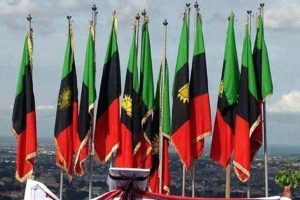
If it were when public advocacy meant something, and when peoples’ sound opinions are valued, I would have taken some pages in the National Dailies, and some sessions on TV or in the Local Radio Stations here in the South-East, to canvass for the setting out of a day for the remembrance of Fallen Biafran Heroes, who died in the Nigerian Civil War that lasted between July 6 1967 to January 13, 1970.
For those who are not at home with History, 30th May 1967, was the day Lt. Col. Chukwuemeka Odumegwu Ojukwu proclaimed the State of Biafra and decared it Independent of Nigeria State. This proclamation was accosted with stiff resistance by then Nigerian government under General Yakunu Gowon who was the then Head of State of Nigeria. It culminated in a 30 Months Civil War, with mass casualties on both sides.
To examine the casualty rate on the Biafran side, there is no family in the core Igbo speaking states of then Eastern Region, that did not lose at least a soul, either by direct involvement in the war front or by the effect of the Starvation Policy, which the then Nigerian side adopted as a strategy to weaken the Biafran side. This led to the cutting off if foods and other relief material supplies, coming from the outside world from reaching the Biafran Land. The starvation strategy was so effective and was later to account for the death of over two million Biafran Children from hunger and malnutrition.
In my family for unstance, my father’s elder brother Mr Maurice Esinkonye who was conscripted into the Baifran Army died in that war.
From the records available to us, the young lad was barely 22 years old when the conscription took place. He ended up dying in the war front because he knew nothing about war. That was Esinkonye family’s experince in that war, in the midst of other collateral damages
Of course the story continues in varying degrees across the lengths and breadths of Igbo speaking states, with some families suffering more, and some others completely wiped out.
The War finally came to an end on January 13 1970, with the Biafran side surrendering to Nigeria. The Nigerian government was later to declare A No Victor No Vanquished Slogan as a post war reconciliatory agenda, but that is not the kernel of this discourse, so need scratching it.
Now, for a region that lost a host of it’s first eleven, together with the destruction of it’s economic progression, all in the bid to assert hersef and defend her people from what she considered an unwanthom progrom at that time. A region that has despite all this major setbacks, still risen to be one of the most prooerous ethnic groups in Nigeria few years after, not to be proud of that history of herself is what baffles my imagination, and is the real crux of this epistle.
For emphasis, no matter how any Igbo man pretends, or tries to massage the egos of any paymaster, the toga of Biafra will live with us forever. So the earlier we embrace that identity with pride as an inestiguishable part of our history, the better for us.
It will do us a better service to relate with other Nigerian as a people who are proud of that history, than to be living in denial in other to please some quarters.
Today, we are decrying the forceful declaration of compulsory Sit-at Home on every 30th May by the Indegenous People of Biafra. The question is, had the governments of the South Eastern States, arisen to their responsibility, by proudly accepting their identity and history, an important occasion such as remembrance of Fallen Biafran Heroes would not have been left in limbo, only to be hijacked by Non- State Actors. Nature abhors vacuum. In life, if those who can do positive refuse to get it started, those who do negative will take the space. Something must be happening at every particular time, wether negative or positive.
However, it is not yet too late. The Governors of the South Eastern State and Ohaneze Ndigbo with other Critical Stakeholders, should come together and adopt a day, like “13th January” of every year, being the day the Civil War ended as a Day to remember fallen Biafran Heroes, this 30th May compulsary Sit-at-Home would be a thing of the past
For crying out loud, how do we feel as a people, that Fifty-Five years after the Civil War, we have not been able to earmark and secure a National Day to commemorate our history and remember those who laid down their lives in defence of their identity. What kind of a people are we?
If our leaders had thought in this line all this while, the Federal Government could have started giving the day so set out, an attention it deserves by now.
By the way, June 12 which is now a National Public Holiday, was once a Yoruba States Affair. But because the government and people of South West accepted it as part of their history, remained proud and consistent in marking it, the Federal government having seen the motive behind it, has adopted it as the true Democracy Day.
In our case, global Igbo functions like World Igbo Congress day, could with time be adjusted into this, to become a more generally participative World Igbo Day, decalring public holiday across the States of the South East.
I believe that when this is done, the day will become more generally accepted. And on such a day, Instead of sitting at home out of fear, it will become a day of celebration for Igbos, with families visiting each other to rekindle the now almost lost Igbo spirit.
Ejike ESINKONYE ESQ writes from Owerri.






